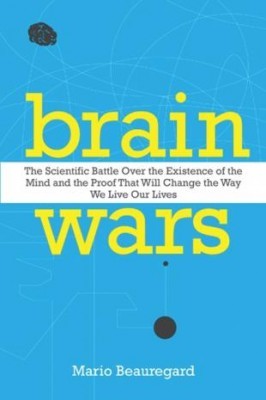For a study on the nature of consciousness, neuroscientist Mario Beauregard’s Brain Wars makes for suspiciously easy metro reading. His second title following The Spiritual Brain argues against a materialist paradigm of the mind – the view that consciousness arises entirely from physical processes in the brain – with examples that include near-death experiences and telepathy. This is officially the first pop science book I’ve encountered to cite sources like the Journal of Paranormal Psychology and Subtle Energies and Energy Medicine Journal.
In lieu of an unsexy reductionist model of consciousness, Beauregard posits that the brain functions like a radio transmitting signals from another dimension or a prism reflecting light. He explains that “the brain usually acts as a filter that prevents the perception of what could be dubbed other realms of reality.” He cites the placebo effect, meditation, and neuro-feedback as evidence for his point, though how any of these discredit materialism is unclear; meditation and neuro-feedback prove our ability to change the physical structure of the brain through conscious processes, and, if anything, support a materialist view of the mind.

Brain Wars
Mario Beauregard
HarperCollins
$29.99
cloth
250pp
978-1-44340-706-9
Call me a narrow-minded science protégé, but I won’t be ripping up my La Senza Bra Club Card anytime soon.
It’s not that the premise of Brain Wars is so wrong. It’s the fact that Beauregard presents his argument as established fact and neglects the first basic condition of any credible scientific theory: that it be testable and falsifiable. In order to prove that another realm of reality sends signals to our brains and is responsible for consciousness, one would need to develop an experiment to tap into this other realm and confirm its existence. If there is a way of doing so, Beauregard fails to propose it. Instead he makes a completely unsupported link between the laws of quantum mechanics and neuroscience, and in the words of quantum physicist Richard Feynman: if you think you understand quantum mechanics, you don’t understand it.
Beauregard so intensely overstates his position that even his credibility is questionable. It is difficult to trust his reasons for writing Brain Wars when he claims his vision restores “dignity and power” to humanity and that we need no longer think of ourselves as “computer[s] made of meat.” His are not scientific motivations. The cheap marketing language couched in the book – “paradigm-shifting,” “cutting- edge,” “eye-opening” – makes this reader doubt his integrity as a scientist.
Scientists have yet to explain consciousness, and perhaps we’re afraid of the potential damage to our fragile egos when they do. But is it so terrible to be a computer made of meat? Does displacing the answer to an alternate reality necessarily salvage our agency? Must admitting how little we understand mean that science as we know it is a sham? We can’t yet answer the riddle of ourselves; but whether we are meat puppets stuck in a boring ol’ mechanistic universe or quantum fairies from another dimension, Beauregard would do well to be more humble in his claims and careful in his logic. mRb






0 Comments